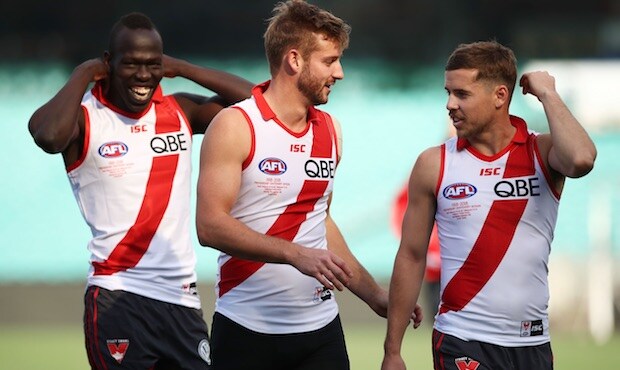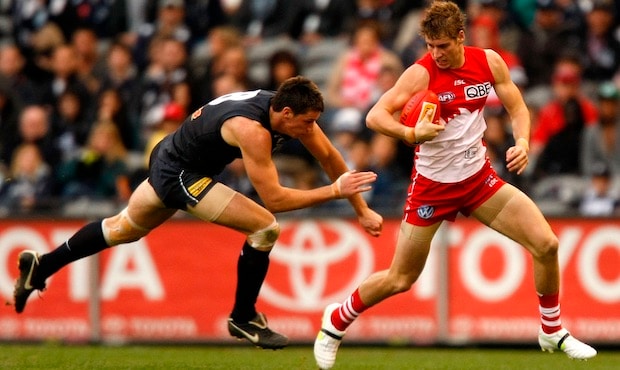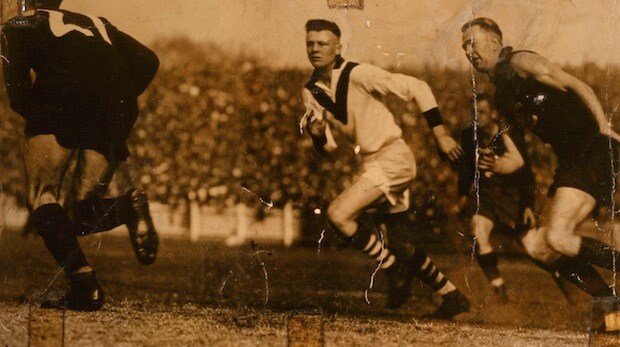What could you do if you had a spare 2136 days? Or in round terms a free six years?
Get a full high school education? Do an apprenticeship and get three years’ work behind you? Or complete three-quarters of a medical degree?
If you drove on average eight hours a day you could drive around Australia 101 times, or you could make the 22-hour flight between Sydney and London about 2329 times.
Or, if you could go 2136 days back in time you could tell Australian Prime Minister Julia Gillard she would be succeeded by Kevin Rudd, Tony Abbott and Malcolm Turnbull, and ask NSW Premier Barry O’Farrell what he thought of Mike Baird and Gladys Berejiklian as successors.
You could have a bet on Green Moon to win the 2012 Melbourne Cup, and even have a long-term investment on Fiorente, Protectionist, Prince of Penzance, Almandin and Rekindling to win the next five.
You could double up on Jackson Bird to be player of the match in the Sydney Test and Michael Clarke to be player of the series as Australia thump Sri Lanka 3-0 in the 2012-13 summer of Test cricket.
Or, if you were a young man of extraordinary courage and conviction, you could do as Alex Johnson has done and cling remarkably to a football dream through a trying six years, which included five knee reconstructions, 12 operations and untold setbacks and complications, and set yourself for one of the most remarkable comeback stories in AFL history.
Confirmation this week that 26-year-old Johnson will make an emotion-charged comeback against Collingwood at the SCG on Saturday night has given cause to one of football’s great feel-good stories, prompting messages of support from well-wishers right across the AFL community.

The Swans have played 142 games since Johnson’s last appearance in the 2012 grand final, when Nick Malceski kicked a goal 40 seconds from full-time to lock away a 10-point win over Hawthorn.
Johnson’s return coincides with Harry Cunningham’s 100th game on Saturday night – and forever the two occasions will be inextricably linked.
Moreover, the Johnson comeback will add a new chapter to a remarkable story that began when he was drafted from the Oakleigh Chargers in the TAC Cup with selection #57 in the 2010 AFL National Draft.
The 194cm defender debuted in Round 3, 2011, on 9 April of that year when the Swans came from 12 points down 17 minutes and 40 seconds into the fourth quarter against West Coast at Subiaco to win by 13 points, after late goals from Jesse White and best afield Adam Goodes, and two from Andrejs Everitt.
So much has happened since then!!
John Longmire was in his third game coaching a side in which Sam Reid played his fourth game, Dan Hannebery his 31st, Nick Smith his 32nd, Josh Kennedy his 40th for the Swans, Heath Grundy his 73rd and Kieren Jack his 74th.
Jarrad McVeigh was two days beyond his 26th birthday and not even half way into his career. He played his 150th.
Johnson became player #1369 on the Swans all-time player list.
Since then no less than 47 players have debuted in the red and white.
Nathan Gordon, Luke Parker, Lewis Johnston and Matt Spangher followed in 2011, and Harry Cunningham, Tony Armstrong, Tommy Walsh and Mitch Morton did likewise in 2012.
In 2013 there was Dane Rampe, Jed Lamb, Tom Mitchell, Brandon Jack, Kurt Tippett, Xavier Richards and Shane Biggs, and in 2014 Lance Franklin was recruited from Hawthorn to join the Swans alongside Jeremy Laidler, Tom Derickx, Jake Lloyd, Dean Towers, Tim Membrey and Sam Naismith.
Isaac Heeney, Dan Robinson, Toby Nankervis and James Rose followed in 2015, George Hewitt, Callum Mills, Tom Papley, Callum Sinclair, Michael Talia, Aliir Aliir, Jack Hiscox, Harry Marsh and Jordan Foote in 2016, and Oliver Florent, Robbie Fox, Will Hayward, Nic Newman, Jordan Dawson and Lewis Melican in 2017.
And this year there has been Tom McCartin, who was only 10 when Johnson was first drafted, plus Ben Ronke, Riley Stoddard, Colin O’Riordan and player #1416 Darcy Cameron.
When Johnson first arrived at the SCG after the 2010 Draft only eight players still on the club’s playing list this year were among those to welcome him – McVeigh, Kennedy, Jack, Grundy, Hannebery, Rohan and Reid.
Within two years he’d built a platform for a long and distinguished AFL career.

From his debut as a 19-year-old in Round 3, 2011 he played 45 of a possible 47 games. He was never dropped, missing Round 6 and Round 12 in his first season with minor injuries, before playing 36 games in a row through to the 2012 premiership decider.
In the same two-year period only seven Swans players – Kennedy (49), Hanneberry (49), Ryan O’Keefe (48), Rhyce Shaw (48), Ted Richards (48), Martin Mattner (48), Ben McGlynn (46) – played more games.
Johnson was among his team’s best players in the grand final and definitely in Norm Smith Medal discussions at half time, and had the final kick in the club’s fifth premiership.
After celebrating an off-season 21st birthday on 2 March 1993 he was looking forward optimistically to his third year at the elite level.
It is difficult, now, to fathom all that he has been through since disaster struck in a pre-season game against the Gold Coast Suns when Johnson blew out his knee for the first time.
To him, it must seem so much longer than six years as he prepares to take what all in football hope will be a new lucky charm into his comeback game.
Having played in jumper #34 for his first 45 games, Johnson will wear the #2 jumper for the first time at AFL level. The number was offered to Johnson by close mate Rhyce Shaw, when he retired at the end of 2015.
A long time between drinks
When Johnson runs out onto the SCG on Saturday night it’s almost hard to believe that he will not set a club record for time between games.
Three players, each with a significant place in Swans history, went for longer periods between games – but for very different reasons.
They include Harvey Kelly, Herb Matthews and Bob Pratt.
Harvey Kelly, officially listed as South Melbourne’s fourth coach when he was appointed to take charge while playing as vice-captain under Vic Belcher in 1913, was 3927 days or almost 11 years between his ninth game for the club as a 19-year-old on 26 July 1902 as his 10th game as a 30-year-old on 26 April 1913.
The 6ft centre half forward from Western Australia, known for his long and accurate kick, played nine games in his first season in 1913 before returning to Perth, where he played two years with East Fremantle and two years with South Fremantle, plus two first-class cricket games for WA.
He returned to the, then VFL, in 1907, playing 43 games with Carlton in 1907-09 and representing Victoria at the inaugural interstate carnival in Melbourne in 1908.
He played in Carlton’s 1907 and 1908 premiership sides, beating South Melbourne by five points in ’07, and in 1909 found himself in a losing Carlton side as South won their first premiership by two points under captain-coach Charlie Ricketts.
In 1910-11 he played in Tasmania, representing the Apple Isle in the 1911 interstate carnival in Adelaide, and in 1912, when unable to secure a clearance from Carlton back to South Melbourne, he toured New Zealand with the South Melbourne Cricket Club and played football with Bairnsdale in the country.
He finally wore Swans colours again the following year, playing 19 games in 1913, and 21 games under captain-coach Belcher in 1914, when his 92-game career ended at the age of 31, in a grand final loss to Collingwood.
Herb Matthews, best known as father of 1940 Brownlow Medallist and Swans Team of the Century member Herbie Matthews Snr, was 3248 days or almost nine years between his first Swans game and his second Swans game.
After playing with North Melbourne in the VFA he debuted in the AFL (then VFL) at 19 years of age on 20 June 1914 against University at Lake Oval. It was his only game for the year and in 1915 he moved to Richmond, where he played three games.
His movements in 1916-18 are uncertain, but he returned to football after the war, playing 50 games with the Melbourne Demons from 1919-1922.
Finally, in 1923, he went back to South, playing his second game for the club on 12 May 1923 aged 28. Over two years, Matthews took his Swans games total to 32.
His grandson, Herbie Matthews Jnr, played 82 games for South from 1964-69.
Bob Pratt, inaugural AFL Hall of Fame legend, also had a long break between games.
The Swans all-time leading goal-kicker and a member of the club’s Team of the Century, was 2424 days or about six-and-a-half years between his 157th game on 2 September 1939 and his 158th and last game on 22 April 1946.
The champion full forward played 157 games and kicked 679 goals from 1930-39, including 150 goals in 1934, which is still an all-time AFL record he shares with Hawthorn’s Peter Hudson.
In 1940 he sought a clearance to Carlton, and when he was told he’d need to sit out three years, he instead went to Coburg in the VFA for two years.
In February 1942, Pratt enlisted in the RAAF and saw active duty overseas before being discharged in November 1945.
He made a football comeback with South in Round 1, 1946 aged 33, kicking two more goals, but suffered a career-ending knee injury and never played again.
Five other Swans players were about six years between games at one stage – Bill Strang, Fred Carpenter, Gordon Goldsmith, Gerry Hayes and Bobby Mullenger – and among 10 players who were about five years between games was Bob Beecroft, the most recent long-time absentee until Johnson.
Beecroft played 64 games with South from 1973-77 before switching mid-season to Port Melbourne in the VFL and playing there until the end of 1978. From 1979-81 he played at Claremont in the WAFL.
In 1982 he returned to the Swans, by then playing out of Sydney, and was 1778 days between his 64th game on 28 May 1977 and his 65th game on 10 April 1982.


